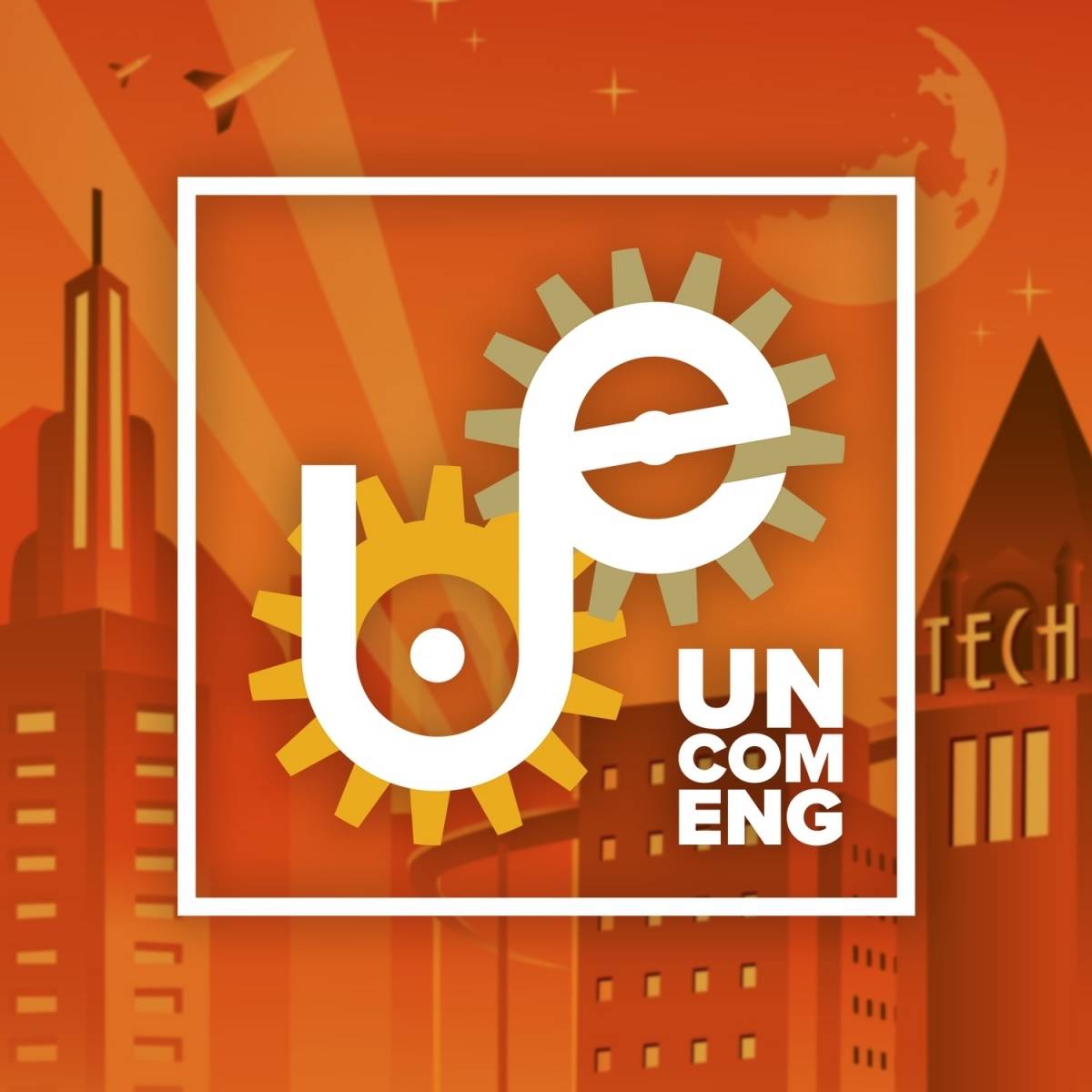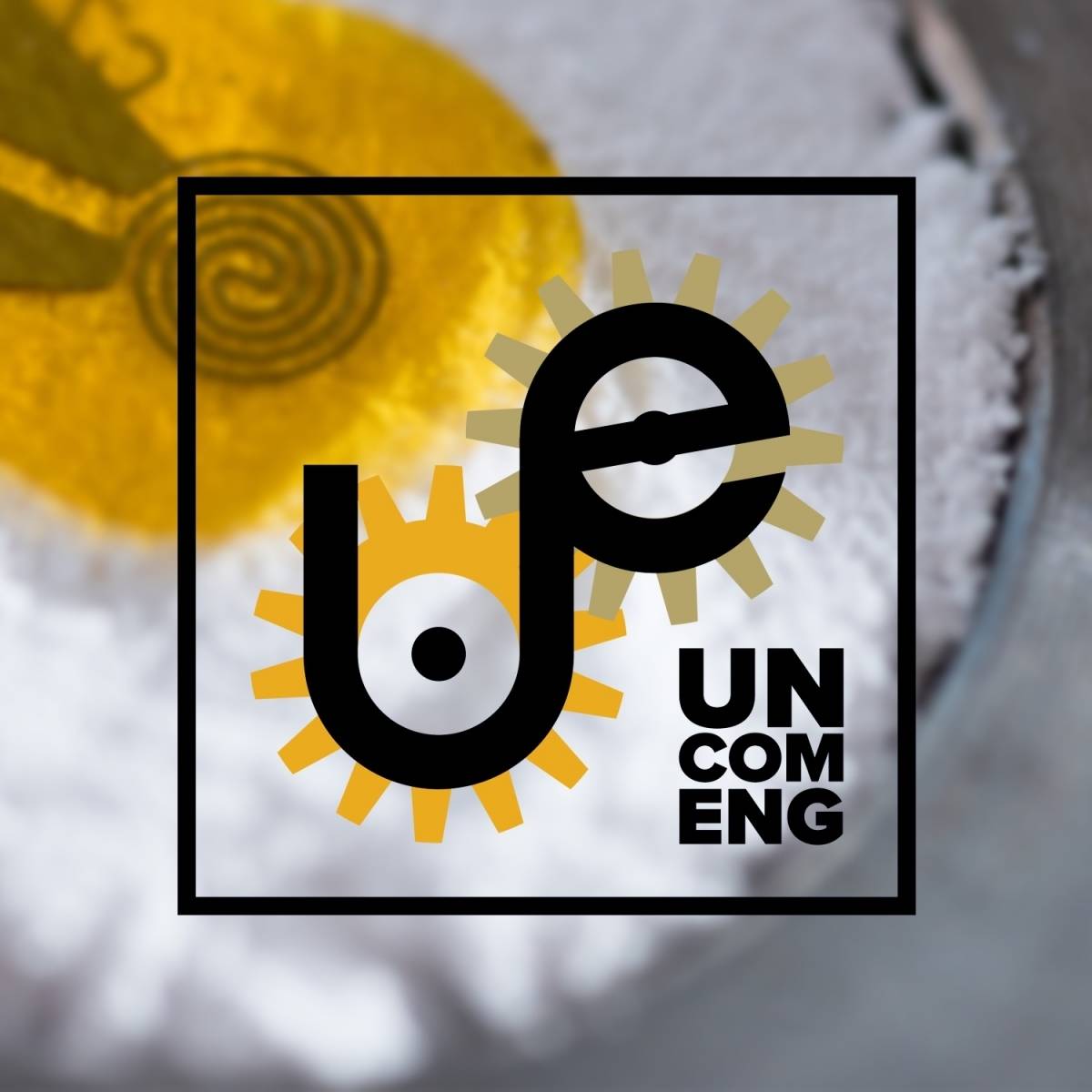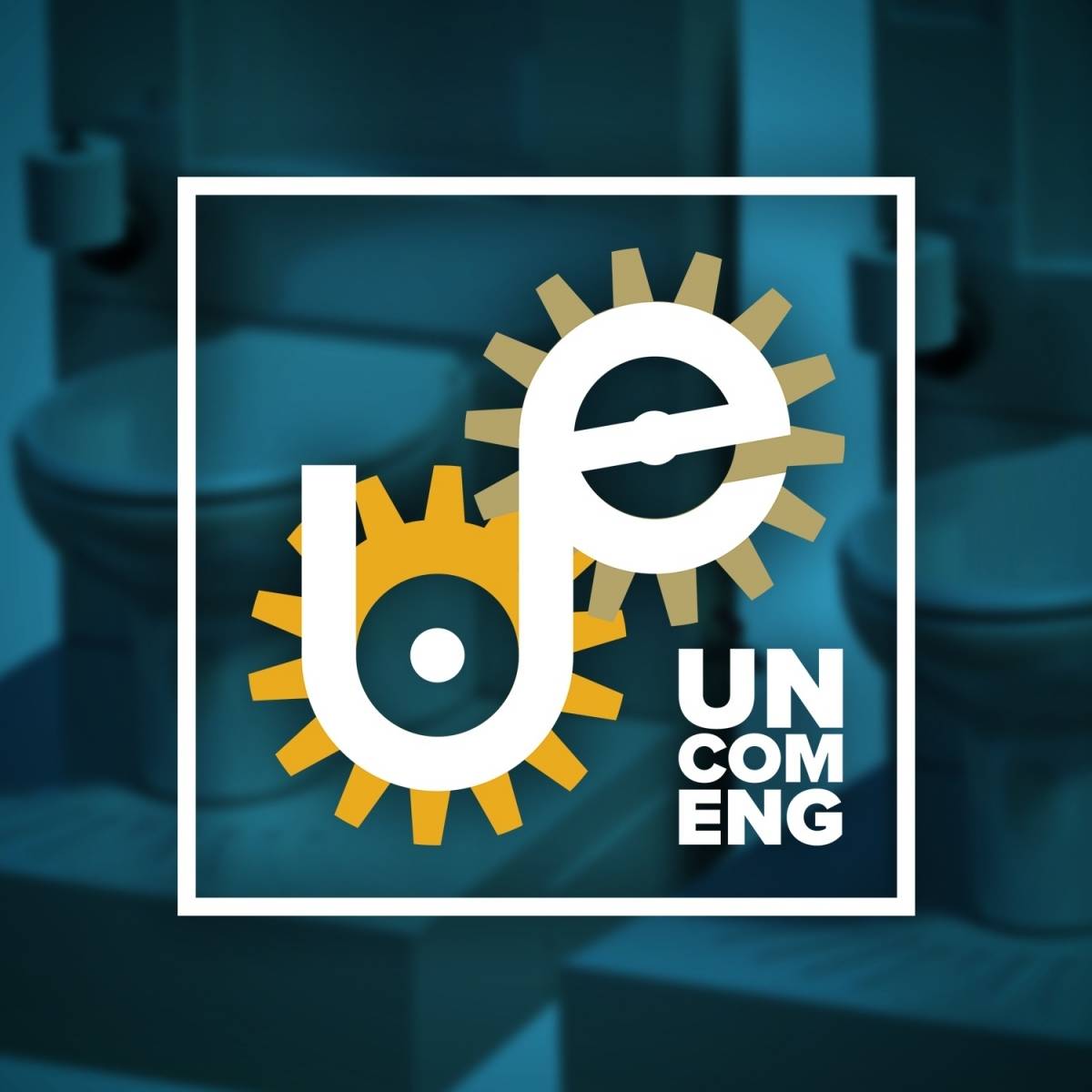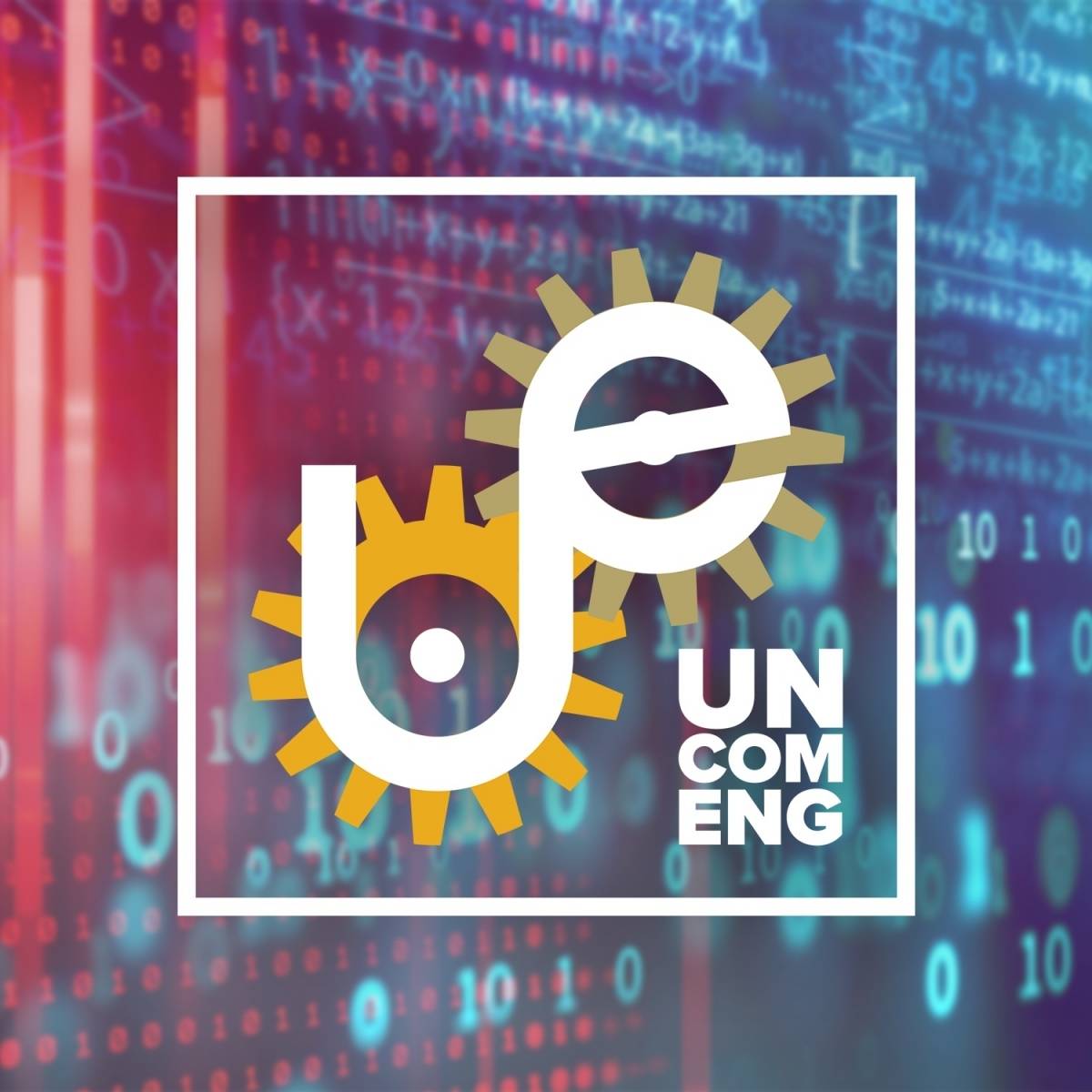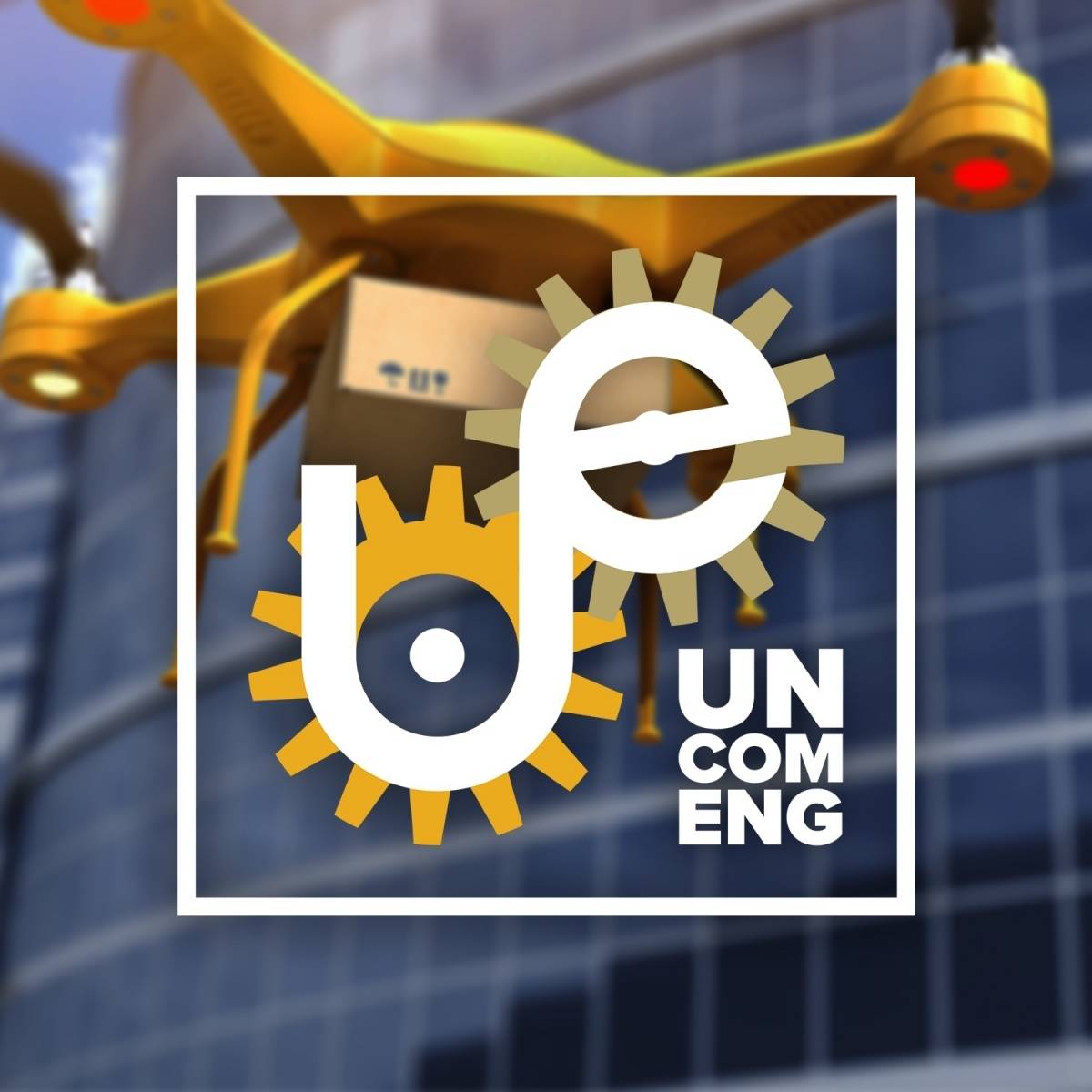Steve W. McLaughlin

Magnus Egerstedt

Edgar Glenn Lightsey

James Rains
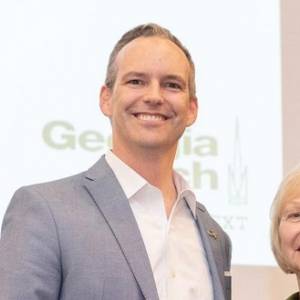
Audio
Audio & Captions
Transcript
[1920s up-tempo jazz music]
Steve McLaughlin: It's hard not to be really enthusiastic about the next decade, and many of the technological advances are happening right now here on Tech's campus. What does that next decade look like? Will we send a man to Mars? Prevent AIDS? No one really knows, but today we have three engineering professors here to weigh in on a few predictions and forecasts for the future.
[steam whistle]
[applause]
[marching band music]
I'm Steve McLaughlin, dean of the Georgia Tech College of Engineering, and this is The Uncommon Engineer.
Man: [archival recording] We’re just absolutely pleased as punch to have you with us. Please say a few words.
[applause]
Steve: Dr. Glenn Lightsey is a professor in the School of Aerospace Engineering. Dr. James Rains is a professor of the practice and director of the Coulter Department of Biomedical Engineering’s Capstone Program. And Magnus Egerstedt is the chair and a professor in the School of Electrical and Computer Engineering. Welcome to the program, Glenn, James, and Magnus.
>> Thank you.
>> Hi.
>> Great to be here.
Steve: So we're going to do something different. And we have three faculty members all doing really cool and amazing things in three different areas of space, robotics, and medically-related things. And so I think we'll start off with space.
Glenn, it seems to me in the last few years, there's just been some kind of, you know, resurgence in space, whether that’s SpaceX, you know, whether it's Elon Musk, whether that's missions to Mars. But it really feels like maybe we're entering into a new space exploration age. And so, you know, there's so many cool things happening on campus related to space. Where do you see, both at Georgia Tech on campus and what the public might see, what's happening in space?
Glenn Rains: Yeah, that's great. There is a big resurgence going on in space and it's happening for a lot of reasons. There's a lot of new energy coming in with sort of the new generation of students. I think that a lot of the barriers to space, which I would say historically are mainly economic barriers, that it just costs so much to get into space are really coming down. The cost of launches is coming down through launch vehicle improvements. The other thing is that we're able to do more with less. And this is something we work on at Georgia Tech, which is in the smaller size of a small satellite being able to have all the capabilities of what used to be a much bigger vehicle. And so these things are leading to a lot more opportunities to fly in space. Everyone can participate. It's not something that is just reserved for big governments and companies now. And so it really is this kind of entrepreneurial spirit that is happening, and I'm very excited about it. This is a great time to be going into the space business with your career ahead of you. There are a lot of opportunities in commercial space where you can form companies and make money by providing services from space. Within a decade we will have humans on the moon, which will be very exciting, and not too much longer after that, humans potentially at Mars. So all of this will happen in the lifetime of our students, and our students will hopefully carry that into the future.
Steve: And so all this resurgence in space, so those of us that are old enough know about the Apollo program, like, say, going to the moon, then the space station program. Is that the core focus— Mars and return to the moon— or are there just a whole bunch of other things? What's going to be the focus?
Glenn: I think it's both. I think that in low-Earth orbit and Earth orbit, what we will see is much more infrastructure growth, so we will see. You know, now we have one space station; we'll probably see multiple space stations, commercial ventures, you know, hotels in space. All of these things will happen. At first, they'll be very expensive and reserved for a few individuals, but that will grow over time. You know, if you look at how many humans are in space today, if you just count them, it's a number like maybe five people at any given time, and that's great— we have a human presence in space— but I believe that like within a decade, that number will grow by an order of magnitude. So we'll have 50 people in space at any point in time. And then, as we look to 2030, 2040, it will grow again, so then 500 people in space. So that's a whole new ballgame in terms of how people live in space and work in space.
Steve: Maybe with a Georgia Tech perspective, there must be some key technologies that we're working on that are needed or that that already exist and that are further development. How's Georgia Tech expertise going to fit into this this vision?
Glenn: We are already a part of this vision because we are kind of optimizing the spacecraft. We're trying to make the spacecraft as capable as possible, and doing more with less. And that's very important from an efficiency point of view. But actually, a lot of the real advancements need to happen in my colleagues’ fields because really it's about human survival in space when humans go into space. And the idea that you would live in a completely closed environment where you would have to recycle, you know, everything that you take with you, and you have to worry about toxicity and medical conditions that might happen in space and the psychology of humans being isolated for long periods of time, so these are things we really don't know much about. And so I think it's the human factor that really we need to develop in and research in, and I'm very excited about that as well.
James Rains: Glenn, I want to know why do we want to go to space? I keep hearing different answers— Buzz Aldrin has a different answer than what other astronauts have. So why do you think we want to go?
Glenn: Well, I don't know that there is one answer. But let me first ask you, James, do you want to go to space?
James: Yeah, because it's cool.
Glenn: Well, there you go. So, why?
James: Because it's cool. I've always wanted to go. It's pretty neat. And people talk about, you know, we're going to live on Mars, and I don't know if that's a reality or not. And why do we need to go back to the moon? We've been there before. What are we really going to learn?
Glenn: It's interesting because you can look at all the reasons to go into space— there are economic reasons; there are political reasons. Ultimately, it comes down to human reasons. That is the justification. Humans have a desire to explore. They have a desire to put themselves in new situations. You know, we grow as a civilization, as a society. And I think instinctively we seek out these new environments and these new challenges, and, you know, inherently you have to believe it will benefit life on Earth, right?
James: Right. That was like with the Apollo missions. I think developing these new things that had collateral benefit that we’re able to use—
Glenn: —all the discoveries, things we can't even anticipate. Better recycling leads to better filtration leads to better water usage— might solve the water crisis for the growing Earth, you know? So there's all kinds of interesting spin offs by putting ourselves in that environment.
Magnus Egerstedt: So Magnus here. Even if there were no benefits whatsoever from an economic or technological point of view, I'm proud to be a member of a species that has the kind of scientific, dreamy nature that we want to get out there and understand our place in the universe and beyond. So I think there is romantic science-y reason also why we, as human beings, should be out there.
Glenn: And ultimately, that is the most undeniable reason. I mean, because, you know, maybe I can't justify it economically or politically, but as a human, I can always come back to that reason. I just have this desire to go where I've never been before.
James: So if you were given the chance, would you go to Mars?
Glenn: Sure, if I knew I could come back—
[laughter]
—which I think is part of the challenge, right, is making it a journey that people can return from.
You can go to any country in the world and talk to people about space, and it doesn't matter where they're from; it doesn't matter, you know, what their political orientation is; everyone is excited about talking and dreaming about space. So it brings people together. It's something that we all have in common, and we all have a role to play. And I think, you know, when you get to these global ventures like going to the moon or Mars, they truly are international ventures. I mean, we would be cutting ourselves off if we didn't take advantage of those partners that are there that want to work with us.
Steve: And even just from a the-problems-that-need-to-be-solved standpoint, my brain continues to kind of explode around everything that has to happen. We just simply don't have the expertise or the money or the— it just seems like [indistinct].
Glenn: And from space you look down, you don't see political borders, right? So the world is just one world. So I think that, you know, that's the philosophy we should have when we go into space.
Steve: Maybe you can pick one technology— maybe it's your own research— pick one technology that needs where is it today and where's it have to get to, let's say, a trip to Mars?
Glenn: Well, I think there's going to have to be a lot more coordination between vehicles. If you think about the way spacecraft work today, they pretty much work as isolated vehicles. And we have to have the capability to actually build things in space. We have to have the capability to vehicles to service one another, inspect one another, work together cooperatively on tasks. And this is something that we're working on at Georgia Tech. We have a couple of formation flying missions that were just awarded in the last year. They're fantastic missions. In one case, we're studying the Earth's upper atmosphere from a global perspective with multiple spacecraft that coordinate their activities and measurements. And in another, we're actually flying three separate spacecraft as a single space telescope, as a space instrument that is more capable than any one vehicle could be. So I think that's the way things will be going for the next decade— that greater sophistication of having vehicles work together cooperatively on tasks which involves machine learning and artificial intelligence and fault identification and bioscience when humans are involved, so there's just a lot ahead of us.
Steve: And that's a that's a great segue to one of other panelists who I know his research in robotics, a lot of that has to do with swarm robotics. Maybe we just step back, Magnus, a little bit and talk and think about the future of robotics. So again, I think there's tons and tons of things in the press around “Robots are going to take jobs! Robots are going to take over the world!” And, you know, I'm not sure if that's the right place to start, but I'm really curious about your perspective either for your own work or for where Georgia Tech fits in in terms of autonomy and robotics, you know? Where are we, and where things headed?
Magnus: The thing that's happened in robotics over the last decade— and we need to go backwards in time to look forward— is traditionally robots where these big mechanical manipulator arms on manufacturing floors doing the same thing over and over and over again— spot welding or painting. And they're very good at what they're doing, but they were caged away from people. No one was allowed to get close to these big mechanical beasts because they were dumb and heavy and dangerous. And over the last two decades, I would say, the robots are escaping. They're leaving their cages on their manufacturing floors and entering our daily lives. We have robots on farm fields. We have, certainly, robots in space. We have robots in our homes, in hospitals. We have robots looking for wildfires as we speak. And what has changed is really not so much the mechanics of the robot; it's really the software. And by being able to be much more effective and clever about how we process data, the access to way more data than we ever had before, combined with better computational powers, has triggered a revolution in really machine learning and artificial intelligence that spilled into the embodied aspect of that, which is robotics. So now robots can reason about the world in a completely different way, can make decisions about, you know, “Where is the lane?” now I’m in my self-driving car. Or, “Is that a cat or a piece of trash that I should be picking up?” as a vacuum cleaner, or in general just making sense of the world in a much more effective way. So that was my incredibly long way of saying that robots are coming. In fact, they're already here, right? So the robots have shown up, and what we're going to see now looking forward is what are they going to do? Because still the robots are employed kind of in specialized settings, but we're going to see much more generalist robots that they're going to be with us in our homes and they're going to be, you know, helping on our farm fields much, much more. And as a roboticist, I worry a little bit about what is this going to look like. Are we going to be turned into batteries to our robotic overlords, or will we be richer as human beings? I certainly hope we will be richer as human beings— “richer” meaning more creative, more equitable, more productive, more healthy, just have better lives. And one of the things that's so exciting about Georgia Tech is we have kind of embraced this idea that it's really not just about the robot; it's about the robot and humans— us and our mechanical cousins.
And the only way to make sense of this interaction is by bringing in, not only engineers and computer scientists, but psychologists and economists and people that study public policy to try to come up with ways to think about what does this society look like where a lot of the things that people spend their time doing today, they will no longer be doing. Robots will be doing that, so what should people be doing instead? So that's where we are right now I think.
Steve: Yeah, I mean, it's absolutely amazing. Again, just like space, you know, the number of things you start to think about and the implication that it can have on society are just enormous.
Now I want to give you a chance to talk a little bit about some platforms that we have here on campus that maybe capture some of that future-looking, like I said, or the future is already here kind of thing that people might not want to be aware. Do you want to talk about some of those platforms and where they might be headed?
Magnus: Yeah. So one aspect of the robots are already here and we're now facing a situation where workers are going to have to be robo-literate. We're going to have to educate the workforce that understands how to not just weld, but weld together with robots or program robots to do welding. How do you get people access to robotics broadly? So one of the problems that we've faced as a discipline is it costs a lot of money, not as much as a spaceship, but it costs a lot of money to build and maintain a world-class robotics platform. And in my particular case, I have lots of robots, which means it costs even more money. So as a consequence of that, there are a handful of places on the planet that matter in the kind of global robotics race— we’re one of them— and as an educator and as a researcher, I didn't like that. And I think Georgia Tech also saw this as an opportunity to kind of democratize access to robotics so that people that aren't representing well-endowed, sharp research universities actually had access. So we built at Georgia Tech this thing called the Robotarium, which is a remotely-accessible swarm robotics lab where people from all over the world can run experiments. They can upload code. They run experiments on our robots remotely to get the results back, to get the data back. And this has been— I mean, we went live in August, 2017, and it's gone absolutely gangbusters since. We have over 500 distinct research labs running experiments— so these are not individuals. We're now over 4,000 distinct experiments being run. We have all continents except Antarctica represented among the users. But to me, this is an example of really advanced technology that pushes state-of-the-art, but also provides access and help solve a societal problem with, in this case, access to robots for the purpose of leveling the playing field when we look forward.
Steve: And so as you said, you know, it's not for the most powerful research institutions—
Magnus: That’s fine anyway, right?
Steve: Yeah, exactly. In order to not only bring more robots to life, but to allow others to appreciate it, to participate for that kind of benefit, to be beyond just the companies or just the research institutions or whatever, you know, finding ways to have broader benefit, that access is huge. I kind of want to go back to the question I asked Glenn— if you were to pick one technology or one of the biggest challenges that either we're working on or that you see to a safe, healthy, productive future of robotics, what are some technologies that people working on?
Magnus: Yeah, the answer to that is going to be a little mundane. We're really good now at the robot brain. And a lot of the developments over, again, the last handful of years, has been on machine learning and artificial intelligence. So robots can reason about the world really well, but for robots to, let's say, cut their hair, it's not a matter of “Do we have a big enough brain,” it’s “Are hands dexterous enough?” And something as simple as a really sensitive, dexterous hand, we don't have. I mean, the human hand is an absolute marvel, and we're nowhere close to anything like that mechanically. And that has to do with things like actuation muscles. We don't have artificial muscles that are close to us, effective, and nimble and elegant as human muscles.
It also has to do with things like energy. Right now, humanoid robots, they schlep with them these giant battery packs, and if you give them a little push, they fall over because their top-heavy, or they have to have cables to get pneumatic power or hydraulic power. So energy— people, we can put things in our mouth and turn it into energy that we then use our amazing muscles to power these dexterous, beautiful hands. We don't have that. So a lot of the things that are preventing robots from truly being useful really hasn't so much to do with reasoning ability, and more this ability to physically engage with the world in a way that sometimes you can punch through walls, and sometimes you can pick up eggs without breaking them, and everything in between— that's what we're missing right now.
Steve: And that's a great segue way to kind of the work that's going on in medicine and biotechnology, because I assume that, you know, if we're going to develop that truly smooth, wonderful human, you know, hand, you're going to be working a lot with biologists. And I think, you know, James, your activities kind of straddle both bioscience as bioengineering, the technology side as well as the students side. Lots of interaction with students and student projects, some of them are resulting in companies. And so I'm really curious about some thoughts that you have about what our students, undergraduate students, young people 17 through 21, you know, the kinds of things that the perspective either that Georgia Tech has or how young people can think about medicine, medical devices, medical technology through their experience here.
James: OK. So the students here on campus are really impressive and their interests are so divergent; they're all over the place, which is great. And I think that's really a result of the opportunities that are available, not just in the classroom, but in research labs and programs that are outside of it. And so they're really able to make the impact in diagnosing disease or preventing diseases or treating diseases or conditions. And so it's really exciting to see all the work that they're doing. And they're also working with not just here on campus, but we do collaborations with Emory University. We have a great program with Emory University. We do work at Grady. And then beyond, we do stuff with the Mayo Clinic and with the companies, all the big leaders. So they're getting great exposure to all these different areas where they can make an impact— cardiovascular, neuro— it's really all over the place, and it's impressive to see.
And so one of the things that I think is really fascinating is the work that's going on in robotics. I mean, that's really impressive. I see a lot of that. I see a lot of growth in that. People are using it for surgery, and they're going to be doing more work in surgery, and that's really exciting. Cardiovascular— I mean, here on campus, I think the stat is every single heart valve that's ever been launched in America has gone through our cardiovascular lab here on campus. And our students are doing that, you know, undergrads, grads, and our faculty. So it's all very fascinating.
Steve: So what are the what are some of the— is it even medicine? We talked about robotics. We've talked about talked about space. Probably medicine is even broader— biomedicine, bioengineering— and there's just so many things to talk about. I guess what I'm really curious about is, you know— because a lot of our listeners are high school students, many of whom are ambitious, who were thinking about Georgia Tech or thinking about, you know, getting going early in their in their career, solving hard problems— maybe you could talk about some of the projects that young people, our own students have worked on, have been successful at, that and that a 17, 18, 19-year-old student can do.
James: Yeah, we have students coming in as freshmen working on projects that are going to be impactful. There's several projects I could talk about that have started off as ideas outside of the classroom or in the classroom, and they kept working on them, and they have turned them now into products, and they're clinically launched and impacting lives. We have a project most of you are probably familiar with, Ethos Medical, so that started off as a Capstone—so a senior design class project that were working with the Mayo Clinic, and it was all about improving how they do lumbar punctures, right? So you have to do a spinal tap, which is not comfortable. The success rate of getting it right the first time is not that good, so they have to do it a few times, and it's not enjoyable, right, so anything you can do to make it better, so they came up with a great solution. They entered and competed in the inventor competition here on campus, and they won that, which was great because they got additional support to work on their intellectual properties, so they got all their patent fees covered which, if you don't know, that's like $25,000 at least you're going to be spending. And then they carried it forward to the CREATE-X program, and they did that. Over the summer, they worked on it. And that's another great program you could talk about, because students can work on any project idea they want, and they're getting mentorship and support and connections and resources. And so they have carried it forward and they're actually right now finishing up their technology development of their concept. They just got an SBIR grant, I think just within the past week or so. And they're going to carry a forward to do an IRB study and get it to manufacturing and get it on the market. So it's been a real— it's been a great story to see because it started off as a class project, and then they took advantages of all these exciting programs and have carried it forward.
Steve: So say a little bit about some of the super amazing things that our researchers are doing.
James: I mean, you could really go on. I will tell you the one I always lead off with is Mark Prausnitz, OK, microneedle. How many people want— how many people like getting shots? I don't know many people who enjoy getting a shot. And so the fact that they can make a patch and put all these microneedles on there to deliver medicine, and so now you're basically putting a sticker or a Band-Aid on somebody and your delivering the drug that way. I mean, that is a huge impact. But then there's also the things about regenerative medicine. That’s, to me, is unbelievable because so many people get like hip implants, knee implants, and you know what that is, it's kind of gross, right? There’s shaving off the end of your bone and they're putting a metal piece on there, you know, and in 20 years, we're going to look back and say, “God, that’s barbaric!” Now they're working on programs where they're going to regenerate the cartilage so you don't need to do that. So instead of having to go through this terrible surgery, now they're going to put something in there to regenerate the cartilage.
And I'll tell you the stuff I've seen recently— I've been going to some international conferences, and the stuff that's really been making a big impact is the robotics. I mean, seeing the stuff that they're doing for surgery is super impressive. The stuff they're doing for rehabilitation is super impressive. I mean, I'm sure you've seen some more amazing things than I've seen.
Steve: So what aspects of whether it's rehab or the actual procedures, what are the amazing things?
Magnus: So I can jump in. And in fact, we have a strong presence both in medical robotics, surgical robotics, and orthotics and prosthetics from a robotics point of view on campus.
And when it comes to surgery, right, I mean, the biggest thing is instead of making a really, really large opening into someone's body and poking around in there, you make a tiny hole, and then you insert a robotic instrument that can make its way over to the place where the piece of surgery needs to be conducted. You can cut. You could actually remove things from that area without having to go through the trauma that comes with open-heart surgery and cracking up someone's ribs. Same thing with brain, right? So doing brain surgery is hard because you got to get to the point in the brain where you're going to do the surgery. Well, if you can actually have a tiny little robotic snake with a scalpel at the end or a pair of scissors at the end that can do this, it's an amazing difference. And we are actually at the forefront jointly with Emory at pushing this particular type of technology.
When it comes to prosthetic and orthotic devices both for rehab, meaning stroke patients, for instance, that have lost mobility or functionality in, let's say, an arm, the way to get back functionality is to repeat over and over and over and over and over again the motions that build back muscle memory and muscle, particularly muscle memory and brain memory, I should say.
But instead of having a person that gets bored or has to good home and take care of their kids or whatever, do that with you, why don't have a robot help you do it? The robots never get bored. They like what they're doing, even if the same thing over and over again. So even there, we're seeing a lot of activity, and it's really exciting because this involves mechanical engineering; this involves medicine; this involves biology. And if I should— if I may say one thing that I think is so exciting about Georgia Tech is there are a handful of truly big questions, defining questions of our time, if you will, you know, our place in space, future of work, feeding a growing planet, climate and energy, personalized medicine. And the only way to get to those big questions is for people to work together across departmental boundaries. And we do that so well here on this campus.
Glenn: One thing about the way engineering is changing and has changed is it's really not a silo-based discipline anymore. And, you know, bringing people together in the spirit of collaboration that we have at Georgia Tech, I think that's really what allows us to do more together because we cross these boundaries. And it's very easy for the students to work on multi-disciplinary projects like these.
Steve: And I think that what a lot of the public doesn't understand what engineers do. And in some of the domains that we've talked about, I think a lot of people think of as the domain of a doctor or someone who does biology or chemistry or a mathematician, and yet we're all engineers sitting here talking about solving big problems. And I'm really curious— someone jump in. You know, engineers like in my and our relationship with the doctors, it seems to me over time the doctors have really grown to appreciate what engineers do. And so I'm curious about everyone's perspective on, you know, a perspective on that.
James: Well, the one thing I was going to say is I've pretty much become agnostic when it comes to engineering. I work with a lot of interdisciplinary Capstone teams or design teams and then just with faculty in general on projects. And what I've learned is you cannot bucket-ize people. I cannot say, well, mechanical engineers, they only have these skill sets. What you learn is that everybody brings something unique to the table and they have a passion about something. So really, it's about uniting people that are passionate about something— it may be robotics, it could be an aerospace project; they want to launch a satellite. It could be many different things, but it’s really just bringing people together to have a similar passion.
Glenn: One thing about, you know, engineering and stereotypes is people think, well, engineers, they work with numbers; they're not very good with people necessarily maybe; and, you know, maybe it's not as human a discipline as another discipline, perhaps. But actually, you know, as a practicing engineer, I can't even think of a more human-oriented discipline. I mean, engineering is all about making human life better, and so engineers are the ultimate humanists, really.
Magnus: I also think that what makes engineers special is, at the end of the day we solve problems. We want to make things better. We want to fix things, and we're not afraid of hard things. And I think that's a rather defining attribute of all engineers on campus here.
Glenn: So I have a question for Magnus, which is, you know, robots are getting smarter. And, you know, people like Elon Musk and Bill Gates say that robot artificial intelligence is like the biggest threat to the future of humanity. So, you know, are we going to need to program like Isaac Asimov's rules into the robots so they can't harm people or anything like that?
Magnus: Maybe. Actually it's true that when robots are now living amongst us, then all of a sudden they are in situations where they can do harm and they can make decisions that we could look at and say, “That that was kind of an unethical decision that that robot made.” So there is a push to kind of look at ethical robotics and robots that make ethically informed decisions. So it's not so easy, as you know, to write a line saying “Don't harm people,” but we are indeed pushing in that direction, I’d say as a field. So yeah, Asimov may have been onto something.
Glenn: OK, let's hope they don't have to— they don't decide they're better off us.
Steve: Well, and I was going to take that one step further, I mean when in talks about the singularity, right, the “how,” you know, kind of the moment at which the robot is truly autonomous and really we lose all control. And I thought that's where we were going to head.
Glenn: Yeah, consciousness, actually.
Steve: Is that— so I get the first one to kind of robots to do no harm, but I think is there anything to the singularity idea?
Magnus: So the singularity idea, really, is we're pretty smart, and we're building smarter and smarter machines. The second we have built machines that are smarter than us, they can build even smarter machines than that, and then we're just going downhill, and all of a sudden we're, again, batteries to our robotic overlords. And there may be something to that, but we're not close to that. This idea of truly generalized intelligence, we don't understand. We can make robots or machines that are really, really, really good at playing chess, but that's it. People— we’re pretty good at playing chess, and we can mow the lawn, and we can play badminton and we can do all sorts of things. This kind of generalized intelligence, we don't actually understand yet. So I think there is some— personally, I think the singularity idea is not that far-fetched, but it's further away than some of the doomsday people think. So I don't think we have to worry for a couple of decades, but let's show up in 40 years and then we'll discuss it.
The thing that I do think we're seeing, though, is really not that we're going to have robots that look like little mechanical people roaming around our houses. Instead, the robots will look different. In fact, part of it is the robots will be in our bodies or that will be part of us. And I was talking to one of our robotics engineers here who said the robot that is coming for sure are toilets. People that are in their homes that need help, you know, some things like feeding that happens every now and then and you can schedule it. But when you need to go to the bathroom, you need to go to the bathroom. And if you're immobilized and, by the way, it's kind of an unpleasant thing to have to ask another human being for help. What if we had robotic toilets? What if we had robotic help to do certain things that we didn't think that that's what the robots are for? So I think, yeah, we're going to see robotic toasters and vacuum cleaners and toilets and robots in our bodies. And they're not going to look like what we think robots will look like. But that's where we're actually going to wake up one day and realize, hey, I'm living in a robotic house.
Glenn: Do we think human lifespans are going to get much, much longer? You know, a lot of people believe that, you know, if we could get rid of the diseases like cancer, you know, and cardio disease, people would live 100 years longer. Is that true?
James: Well, first of all, so the average lifespan is getting a little bit longer. But if you look at how long people live, that's actually not getting higher; you just basically are having fewer people die earlier. So back in the day, like 100 years ago, you had more newborns passing away and then, you know, cancer and things like that. But now they're able to treat cancer better. So the average age that people will live to is going to keep going up. And will people live beyond like 117 or something like that? Maybe. I mean, this regenerative medicine is really opening the door. I mean, they're looking at some really fascinating things. If you’ve ever seen the video where they cut the limb off and the animal like regrows, I mean, if they if they crack that nut and they can actually start treating injuries and not make aging happened so quickly, I think it could.
Glenn: I think I saw a movie called Swamp Thing once where that happened.
[laughter]
Magnus: So I think it's clear that we're going to live way longer. It's just a matter of what does it mean for us to live, right? So it used to be yeah, we died because we were eaten by a tiger. And then we died of heart disease. And then we fixed that a little bit at least. And then we died of cancer. And now we're dying of brain problems. So but every time we keep pushing, there's something else on our bodies that break. But with this kind of man-machine melding that's talked about, then you know what? Why don't we outsource our brain to a computer somewhere? And then it's OK. Then we'll wait for the next thing to break.
Glenn: Just download your consciousness into a machine.
Magnus: And send it to Mars.
Glenn: There you go. And you won't have to breath air either.
Magnus: No, but I mean, that's one of the problems in space, right? Space is dangerous to human beings.
Glennn: Sure. Absolutely. So, yeah, we have a lot of problems to solve. You know, if we want to go to Mars or, you know, just beyond Earth orbit, we have to deal with the radiation from the sun. You know, we're protected by the Earth's environment. And in fact, we've evolved, you know, to live in that environment. And actually, when you get beyond Earth, the radiation you get from a solar storm might be, you know, more than 10 times what you can get in your entire life in just a couple of days unless you have some means of protection, somewhere you can go, some shelter that you can kind of ride the storm out in. So there's a lot of interesting problems that have to be solved. I think the most interesting problems for space travel for humans space travel are really medical and psychological issues. You know, like how do you how do you keep people engaged in a tiny space for two years, you know, where they really can't leave their vehicle if they want to without dying. So, you know, these are really challenging issues.
Magnus: And it's true, I mean, human beings, we’re largely water and liquid. It's affected by gravity. We're built for a certain gravitational environment. You move that somewhere else and you see things like our eyes that are, again, basically liquid, start to really degenerate quickly in space because the gravitational environment is different. So we've got to solve those problems.
Glenn: Yeah. There's calcium issues there because your bones don't have to be as strong anymore. There's cardio issues. And the exciting thing is, I think all these are solvable problems. In fact, we can create essentially artificial gravity by rotating the vehicle. So, you know, essentially you feel the effect of gravity from centrifugal force, and so your body doesn't know the difference essentially.
James: What was the study that they did were they sent the guy to the International Space Station for a year and his twin was down here?
Glennn: Yeah, the Kelly Twins Study.
James: Right. What was the outcome of that? I know that there was a difference, but what was it?
Glenn: There were definitely a number of differences, and they’re still actually trying to determine what all the differences are. I think one of the interesting things is they believe there's perhaps a slight difference in cognition, you know, the ability to perceive things as efficiently after a person has been in space for a while. Has that degraded? Is it a permanent effect or a temporary effect? A lot of the discomforts you have from going into space, if you if they don't kill you when you come back, you will recover from them in a couple weeks or something. So the question is just, not only will you survive the journey, but will you survive returning to the planet once you get there?
James: The way that they're going to start diagnosing things— digital health. So all this predictive and big data, it's fascinating because I just saw somebody from Facebook talking about 2.5 quintillion bytes of data is collected every day. So quintillion, I had to look it up— 18 zeros— OK, so a lot of data, and they're starting to collect it. So there's one technical challenge about where do you store it all? What do you do with it? That's really the next thing. What are we going to do with all this data? But there's so much data out there, they're going to be able to use it to predict things, to diagnose things. Like maybe your Apple Watch, maybe it’s going to start picking up on minor tremors and they can connect it to early onset Alzheimer's— I don't know.
Magnus: So beyond data and compute, the other thing that's remarkable about this is connectivity, meaning with all this data and your very smart watch and it manages to figure out something about your health conditions based on something, then all of a sudden all smartwatches on the planet will know the same thing, or at least everyone that’s subscribed to your medical records, right? No, but there are— this combination of compute power, data, and connectivity really, really is powerful. But it's also a little scary. I mean, to me, privacy and security is one of the major questions here as well.
James: Yeah. To me, the fascinating— the DNA that— they're doing the DNA samples, but what not everybody's paying attention to is what they're doing with your data and how they're doing drug development from your data. So they're making—
Glenn: So you sign those apps, and you give up all those rights, yeah.
James: So the side hustle is really giving you the history, but the big play is developing new drugs from it, which is great.
Glenn: When you talk about more connectivity and how it's changed the world— and it definitely has— and kind of effortless movement of information, but if you think about like humans, we process incredible amounts of data like what your eye takes in, what your ear takes in, and all this happens in real time. Your brain, you know, without you even being aware of it, processes all this information, and you filter it; you determine what's important. And I think that's one area that we haven't advanced to yet. We have all this information coming in, but we don't have the filters to say, well, this is the important information that you should pay attention to, and this is just background noise. But it is really amazing. Like with, you know, I've heard about like AI identifying breast cancer tumors, you know, months before a human could see a pattern, that kind of thing. So, you know, it can definitely help.
Magnus: Yeah, but it's a good point. I mean, we keep hearing “big data, big data, big data,” but at the end of the day, I want small data, but I want the right data.
Glenn: Actionable data.
Magnus: Yeah, actionable, meaningful.
Steve: Not messy data.
Magnus: Not messy data. And yeah, that's hard. And we don't fully know how to do it yet.
Steve: One of the questions we always ask on The Uncommon Engineer is what makes you an uncommon engineer? Glenn, what makes you an uncommon engineer?
Glenn: You know, that's hard to say. I don't know that this is uncommon, but I do feel that one very important part of how I got to where I am is I always just did what I loved, right? I mean, it was always a matter of identify the thing that you really love to do, and just follow that wherever it goes. And I know that at times I had choices to do other things, but I've never looked back. I've always been happy with where I am, so maybe that makes me uncommon— I don't know.
Magnus: My path to engineering is it's a little non-linear and not particularly direct. I, as a roboticist, I am supposed to have grown up building robots, but I didn't. In fact, I was an undergrad studying philosophy. That was my major as an undergrad, and I was interested in things like consciousness and mind, and what does it mean for something to have intelligence or be able to feel something. And I really enjoyed this, but felt like, first of all, no one's going to pay for me to sit around and have deep philosophical thoughts. And secondly, you know what? I'm not going to solve anything hard by just sitting around and having deep philosophical thoughts. So from there, I jumped into physics, and I really felt that I needed to understand the physical world better in order to be able to really connect what it means to be conscious with things in the world. But as part of that, I know slid into mathematics. But I am an engineer because I solve problems. I love all these problems. I've worked as an engineer. But to me, it's almost more of a mindset— a way of thinking about the world as opposed to a particular set of courses. So, that's why an uncommon engineer.
James: All right. So as far as me, James, why am I an uncommon engineer, well, my path where I am is kind of circuitous as well. I started off as an electrical engineering major here at Georgia Tech, and I heard my roommate talking about his class one day. He was a mechanical engineer. And I thought that everything he told me, I was like, that is the coolest thing I have heard. So I coopted as an electrical engineer. I really enjoyed it. I will say I really enjoyed it. Anyway, so I switched to mechanical engineering, and then I just assumed I was going to work in automotive or something like that, and I really wanted to do design. That's all I wanted to do. And I interviewed at a company called Stryker. I had never heard of them, which in the medical field you would kind of laugh at because they're a huge, huge player. And I remember I went to the interview and the guy said, “Do you know who we are?”
And I said, “I have no clue what you do, but you're looking to hire design engineers. That's what I want to do.”
And so very ignorant, but I just fell into that job. I could either design nuclear subs or medical devices, and I picked the medical devices because it was the lowest-paying job, but it was the coolest job. And it took me down this path, and it's been awesome. So my path to getting here was not planned in any way.
Steve: Well, yeah, this was a lot of fun. This was of something really different for The Uncommon Engineer, and we really appreciate you taking the time. We're incredibly lucky to have folks like you on our campus caring for our students, doing amazing work, and thinking about some of these hard problems. So thank you all for being on The Uncommon Engineer.
[marching band music]
In Absentia
We found no additional GEEKOUT content for this episode.

